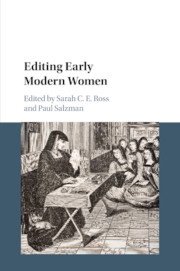Book contents
- Editing Early Modern Women
- Editing Early Modern Women
- Copyright page
- Contents
- Figures
- Contributors
- Book part
- Glossary
- Chapter 1 Introduction
- Part I Editorial Ideologies
- Part II Editing Female Forms
- Part III Out of the Archives, into the Classroom
- Chapter 11 Out of the Archives
- Chapter 12 Anthologizing Early Modern Women's Poetry
- Chapter 13 Modernizing Katherine Austen's Book M (1664) for the Twenty-First-Century, Non-Expert Reader
- Part IV Editorial Possibilities
- Select Bibliography
- Index
Chapter 12 - Anthologizing Early Modern Women's Poetry
Women Poets of the English Civil War
from Part III - Out of the Archives, into the Classroom
Published online by Cambridge University Press: 05 August 2016
- Editing Early Modern Women
- Editing Early Modern Women
- Copyright page
- Contents
- Figures
- Contributors
- Book part
- Glossary
- Chapter 1 Introduction
- Part I Editorial Ideologies
- Part II Editing Female Forms
- Part III Out of the Archives, into the Classroom
- Chapter 11 Out of the Archives
- Chapter 12 Anthologizing Early Modern Women's Poetry
- Chapter 13 Modernizing Katherine Austen's Book M (1664) for the Twenty-First-Century, Non-Expert Reader
- Part IV Editorial Possibilities
- Select Bibliography
- Index
Summary
- Type
- Chapter
- Information
- Editing Early Modern Women , pp. 215 - 231Publisher: Cambridge University PressPrint publication year: 2016

